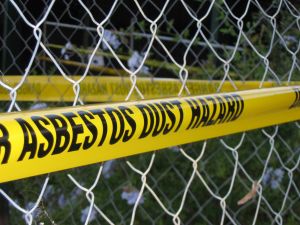The Supreme Court of California has agreed to hear an appeal involving a plaintiff who sued his uncle’s employer. According to a recent article in the San Francisco Chronicle, the plaintiff, who is dying from mesothelioma, has alleged that he was exposed to asbestos when his uncle returned home from work covered in asbestos dust.
 His uncle worked for a company that manufactured asbestos-filled brake linings for automobiles. Under the normal rule, an asbestos manufacturer is not liable for illness to anyone who came in contact with its employees. However, the intermediary court of appeals held that a company that uses toxic materials must take appropriate steps and use reasonable efforts to keep safe family members who live with their workers.
His uncle worked for a company that manufactured asbestos-filled brake linings for automobiles. Under the normal rule, an asbestos manufacturer is not liable for illness to anyone who came in contact with its employees. However, the intermediary court of appeals held that a company that uses toxic materials must take appropriate steps and use reasonable efforts to keep safe family members who live with their workers.
Pllaintiff said that he would spend around three nights a week in his uncle’s home as a child and remembers his uncle being covered in dust from work. As our Boston mesothelioma lawyers know, asbestos consists of six naturally occurring silica minerals and has been used through the industrial revolution in a variety ways, due its ability to withstand heat, electricity, and many caustic chemicals. It was used in brake linings to prevent the brakes from overheating and catching fire, which can happen on large commercial vehicles.
This dust contains asbestos fibers, which, when breathed, can become embedded in lung tissue. With no way to remove the fibers, they can lead to cancer in the lungs and abdomen. The most common, and also the most deadly, cancer caused by asbestos exposure is mesothelioma. One of the most dangerous aspects of the disease is that a person does not usually develop symptoms until 20 to 50 years after exposure. By the time symptoms are detected and the person gets a diagnosis, the cancer is likely in an advanced stage.
The article reports defendant had a pamphlet that warned of the dangers of bringing work clothes home but did not give the pamphlet out to its workers. Despite the evidence, the trial court dismissed plaintiff’s lawsuit on grounds that the company did not owe a duty of care to the worker’s family. In any negligence action, the plaintiff must establish that the defendant owed a duty of care to protect foreseeable persons from foreseeable harm.
In this case, the issue is whether the people in the worker’s home were within the zone of foreseeable injury. The intermediary court found in the affirmative and reversed the trial court’s dismissal. Defendant then appealed to the state supreme court, which has agreed to hear the appeal.
It seems that the courts of the state are divided on this issue. While some courts agree that it was foreseeable that a worker’s family was at risk of exposure to any material brought home by the worker, other courts have held that family members were not within zone of foreseeability.
If you or a loved one is diagnosed with mesothelioma in Massachusetts, call for a free and confidential appointment at (617) 777-7777.
Additional resources:
State high court to rule on suit by asbestos-worker’s family, August 21, 2014, San Francisco Chronicle
More Blog Entries:
Asbestos In City Buildings Poses Risk, August 12, 2014, Boston Mesothelioma Layers Blog
 Mesothelioma Lawyers Blog
Mesothelioma Lawyers Blog

